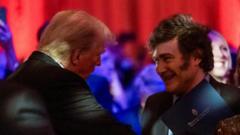In a significant political shift, Argentina's newly elected leader, Javier Milei, has disclosed plans to exit the World Health Organization (WHO), following the contours of former U.S. President Donald Trump's recent withdrawal announcement.
Argentina's Milei Plans WHO Exit, Echoing Trump’s Move

Argentina's Milei Plans WHO Exit, Echoing Trump’s Move
Argentina's President Javier Milei announces the nation's intent to withdraw from the WHO, aligning his policies with the former U.S. president's stance.
In the backdrop of rising tensions over global health management strategies, President Milei's administration cited "deep-seated differences" stemming from the WHO's handling of the Covid-19 pandemic as a catalyst for this decision. The spokesman for Milei emphasized that Argentina must prioritize its sovereignty and control over health-related matters.
Only weeks after Trump's executive order laid the groundwork for the U.S. departure from the health organization, Milei's administration appears to be inspired by similar motivations, including criticism of the WHO's pandemic strategies and concern over external influence, particularly from China.
While the U.S. contributes approximately $950 million annually, making it the largest financial supporter of the WHO, Argentina's modest allocation of about $8 million annually suggests that its exit will have limited financial ramifications on the organization. However, observers note that if other nations follow suit, it could undermine the credibility and functionality of the WHO remotely.
Milei, a self-styled "anarcho-capitalist," has long voiced criticism of international organizations that he perceives as infringing on national interests. His administration’s move to withdraw from WHO is expected to be formalized soon through an executive order.
Additionally, there are growing concerns among environmental advocates that Milei could take similar steps against other agreements, such as the Paris climate accord. His administration's aggressive stance suggests a broader agenda aimed at re-evaluating Argentina’s place within international frameworks.
Calls for freedom and autonomy resonate loudly within Milei’s rhetoric, indicating potential shifts in not just health policy but broader international relations as his government seeks to reclaim control from international entities. This development could invoke a new wave of global political realignment, particularly among leaders who share Milei’s worldview.
As Milan's administration ramps up its efforts to redefine Argentina's geopolitical stance, the implications of this decision may unfold in various sectors, influencing the nation's domestic policies and its role on the global stage.
Only weeks after Trump's executive order laid the groundwork for the U.S. departure from the health organization, Milei's administration appears to be inspired by similar motivations, including criticism of the WHO's pandemic strategies and concern over external influence, particularly from China.
While the U.S. contributes approximately $950 million annually, making it the largest financial supporter of the WHO, Argentina's modest allocation of about $8 million annually suggests that its exit will have limited financial ramifications on the organization. However, observers note that if other nations follow suit, it could undermine the credibility and functionality of the WHO remotely.
Milei, a self-styled "anarcho-capitalist," has long voiced criticism of international organizations that he perceives as infringing on national interests. His administration’s move to withdraw from WHO is expected to be formalized soon through an executive order.
Additionally, there are growing concerns among environmental advocates that Milei could take similar steps against other agreements, such as the Paris climate accord. His administration's aggressive stance suggests a broader agenda aimed at re-evaluating Argentina’s place within international frameworks.
Calls for freedom and autonomy resonate loudly within Milei’s rhetoric, indicating potential shifts in not just health policy but broader international relations as his government seeks to reclaim control from international entities. This development could invoke a new wave of global political realignment, particularly among leaders who share Milei’s worldview.
As Milan's administration ramps up its efforts to redefine Argentina's geopolitical stance, the implications of this decision may unfold in various sectors, influencing the nation's domestic policies and its role on the global stage.





















